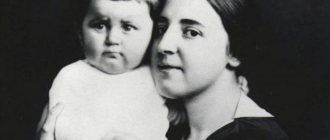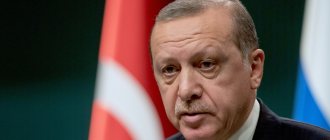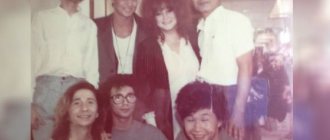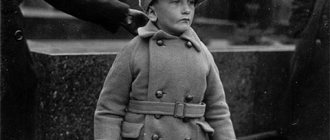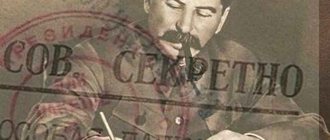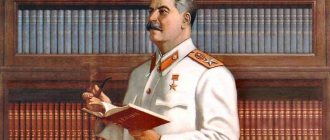Joseph Vissarionovich Stalin was married twice. In both marriages he had children. At the beginning of the 20th century, the future leader of all nations, at the age of 29, married 21-year-old Ekaterina Svanidze. The marriage lasted only 16 months, as the young woman died giving birth to her son Jacob a month before the death.
When Stalin was 40, he married a second time - to the daughter of his comrades, Nadezhda Alliluyeva. At first this marriage was happy, but over the years it became unbearable for both spouses. After another quarrel in the fall of 1932, Nadezhda locked herself in the bedroom and shot herself. After her death, Stalin was left with a six-year-old daughter, Svetlana, and a twelve-year-old son, Vasily. How did the destinies of Joseph Vissarionovich’s descendants turn out? Where did they live after his death, what did they do? Read about this in our material.
Yakov Iosifovich
Stalin's firstborn was born in 1907. He was raised by his mother's relatives. He saw his father only in 1921. Relations with him were tense. They became especially aggravated when young Yakov announced his desire to marry Zoya Gunina, who by that time was 16 years old. Stalin did not approve of the marriage, and took Yakov’s disobedience as a personal insult.
70-year-old Vera Wang revealed the secret of why she looks so young at her age
How to make a flower pot from an old tire: simple instructions
Ed Sheeran is ahead again: his net worth is estimated at £200 million
The young man attempted to commit suicide. Communication with my father practically ceased after that. Yakov married Zoya, but family life did not work out from the very beginning. He married for the second time in 1936. His chosen one was the beautiful ballerina Julia Meltzer. A year later, Yakov entered the Red Army Academy.
During the war years (1941-1945), Stalin's eldest son was captured and placed in the Sachsenhausen concentration camp. In April 1943, Yakov Iosifovich threw himself onto the wire fences of the camp, through which a high voltage current was passed. He left two children: son Evgeniy and daughter Galina.
Alliluev Sergey Yakovlevich: 1890 ~ 1917
After his father’s death in 1871, his mother, unable to feed her 5 children, sent 5-year-old Sergei Alliluyev to a neighboring village to live with her sister. Where he lived until he was 14 years old. By the way, the next time Sergei Alliluyev saw his younger brother, whom his mother also gave to strangers, was only in 1925, 54 years after the separation.
Until the age of 14, Sergei Alliluyev lived in the village with his mother’s sister, after which he went to work in Tiflis (Tbilisi), where he remained permanently and never returned to the village.
In Tiflis he worked as a worker in the Tiflis railway workshops.
In 1893, 27-year-old Sergei Alliluyev officially married 16-year-old Olga Fedorenko, with whom he began their life together when Olga was 14 years old.
In 1986, Sergei Alliluyev became an assistant driver at the Mikhailovo station depot and became involved in revolutionary activities. In the same 1896, Sergei Alliluyev became a member of the Tiflis Social Democratic organization.
In the spring of 1899, due to Alliluyev’s illness, the family moved to Yekaterinoslav, where Alliluyev met the revolutionary Grigory Petrovsky, who launched Alliluyev’s active revolutionary work.
Despite the fact that Sergei Alliluyev was one of the oldest revolutionaries, history has not preserved significant facts from his revolutionary activities. And if not for his daughter Nadezhda Alliluyeva, who became Stalin’s wife, then most likely there would have been one line left in history about Alliluyev, in which it would have been written that Vladimir Lenin stayed at Alliluyev’s apartment in 1917.
Nevertheless, Sergei Alliluyev was arrested 7 times and twice administratively expelled from his permanent place of residence. .
In 1903, Alliluyev and his family were once again expelled from the Caucasus. First, the family moved to Rostov-on-Don, and then to the capital of the Russian Empire, St. Petersburg.
In the capital, Sergei Alliluyev, thanks to the help of the revolutionary Krasin, became the director of one of the substations in St. Petersburg with a very high salary, allowing the Alliluyevs to live comfortably; suffice it to say that all four children studied at the gymnasium, which at that time was very expensive. .
In St. Petersburg, the Alliluyev family rents a large four-room apartment with an area of more than 100 square meters. m., for which Sergei Alliluyev pays a lot of money - 70 rubles per month.
In St. Petersburg, Alliluyev almost completely withdrew from revolutionary activities, only occasionally providing an apartment for secret meetings and overnight stays for revolutionary comrades.
But everything changes in 1917...
Evgeniy Yakovlevich
At first he bore the name of his mother, Olga Golysheva, but soon his father insisted that Evgeniy become Dzhugashvili. The grandson of Joseph Vissarionovich was an officer. He graduated from two military academies - them. Lenin and them. Zhukovsky. He retired with the rank of colonel in the early 90s.
What the adult daughter of Vizbor and Uralova, the stars of the film “July Rain,” looks like
Activities and games that bring you closer together. Advice for grandparents and their grandchildren
I put the dough in an ice tray and the toppings on top: strange but delicious pizza
Evgeniy Yakovlevich was involved in politics and history, social activities not only in his native Georgia, but also in Russia. He passed away in 2020 at the age of 80. He left two sons: Vissarion, who became a director and lives in the USA, and Yakov.
Alliluyev Sergei Yakovlevich - father of Nadezhda Alliluyeva, Stalin's second wife
Alliluyev Sergei Yakovlevich (1866-1945) - Russian revolutionary. One of the oldest participants in the Russian revolutionary movement. He began revolutionary activity around 1896, first in the Caucasus, then after 1907 in St. Petersburg, after his expulsion from the Caucasus. He did not take any significant part in historically significant events of the revolutionary movement. During his revolutionary activities he was detained 7 times, twice subjected to administrative expulsion from his permanent place of residence.
He was personally acquainted with almost all significant participants in the revolutionary movement, including Ulyanov Lenin.
After moving to St. Petersburg in 1907, he almost completely withdrew from revolutionary activities, limiting himself to providing an apartment for meetings and overnight stays of revolutionary comrades.
In 1918, after his daughter Nadezhda Alliluyeva got along with Stalin in 1918, he became his father-in-law.
In the post-revolutionary period, he worked in various minor leadership positions.
He was married, his wife was Olga Evgenievna Fedorenko. Somewhere after 1932, Olga left Alliluyev forever and they lived separately until the end of their lives.
He had four children, three of whom died, died or were repressed with the direct participation of Stalin. The fourth son, Fyodor, worked as Stalin’s secretary from 1918 to 1953.
He died on July 27, 1945 at the age of 79 in Moscow in the hospital on Granovsky. Cause of death: stomach cancer. He was buried in Moscow at the Novodevichy cemetery.
Vasily Stalin
Vasily always grew up as an active and mischievous child, so his father often told his teachers to behave as strictly as possible with him. In 1938, he entered the Kachin Aviation School. In the team he was considered an easy-going person. Before the war, Vasily married Galina Burdonskaya, the great-great-granddaughter of a soldier in the Napoleonic army. The marriage, which produced two children, lasted four years. Vasily forbade his wife to meet with their children. She saw them eight years later.
Why pick young nettles on May 16: signs and beliefs
My omelet turns out delicious thanks to the cabbage and pepper. I make it with soy sauce
A person with coronavirus is most contagious the day after symptoms appear
Once again, Vasily married the daughter of Marshal Timoshenko in 1944. Two more children were born into the new family. Thus, Vasily Stalin, who died in 1962, was left with two daughters, Nadezhda and Svetlana, and two sons, Alexander and Vasily.
Alexander Burdonsky was a director who served at the Russian Army Theater. He passed away childless in 2020. Vasily's youngest son, named after his father, lived in Tbilisi. He was a drug addict and shot himself at age 23.
Descendants of Stalin: volcanologist, hematologist, pianist and artist
Stalin's grave in Moscow, photo AFP
Today marks 55 years since the death of Joseph Stalin. This day usually passes quietly: communists bring flowers to his grave on Red Square in Moscow, newspapers remind of the number of people repressed during the 30 years of Koba's rule (one of Stalin's nicknames), and few people remember his few relatives scattered around the world. “Today” found out that Stalin’s daughter from his marriage to Nadezhda Alliluyeva, Svetlana, still lives in London. Three of his grandchildren are alive, and so far only three great-great-grandchildren can continue his family line.
GRANDSON - COLONEL, GREAT GRANDSON - ARTIST. Paradoxically, the surviving direct male line of the Dzhugashvili family originates from Stalin’s only son from his first marriage to Ekaterina Svanidze - Yakov, who was shot dead in the German concentration camp Sachsenhausen in 1943 while trying to escape. Yakov was married twice and from each marriage had one child - a son, Evgeniy Dzhugashvili, and a daughter, Galina. Evgeniy Yakovlevich for some time headed the Communist Party of Georgia, whose headquarters were located in Stalin’s hometown of Gori. But after Mikheil Saakashvili came to power in 2004, the Georgian Communist Party was banned, and now 72-year-old retired colonel Yevgeny Dzhugashvili (he worked for 25 years as a senior teacher of the history of wars and military art at the Academy of the General Staff of the USSR Air Force) is resting. He lives either in the capital of the Russian Federation or in the capital of Georgia.
Great-great-grandchildren. 13-year-old Joseph and 7-year-old Vasily live and study in Tbilisi. In the center is their grandfather, Stalin's grandson Evgeny Dzhugashvili
“I meet with friends in Moscow,” Evgeniy Yakovlevich told Segodnya. — On May 9, Victory Day, I definitely go to Red Square, but mainly I guard the apartment for my descendants. I usually come to Russia once every three months to pay for utilities.
“My father feels uncomfortable in Tbilisi because he doesn’t know the Georgian language,” says Yevgeny Dzhugashvili, 36-year-old great-grandson of Stalin, Yakov Dzhugashvili, another reason why Yevgeny Dzhugashvili often travels to Russia. — He experiences discomfort in transport, in shops. Special thanks to him for forcing me and my brother to learn Georgian.
TRIALS IN LONDON. Yakov Dzhugashvili is an artist by vocation and education. In the 1990s he graduated from the Glasgow School of Art and the University of Edinburgh, UK.
— I studied at the Academy of Arts in Tbilisi. After the collapse of the USSR, chaos began in the country. My father saw how I sat at home all day, didn’t go to classes, everything was falling into disrepair, and decided to send me somewhere to study. Of course, we didn’t have that kind of money. The head of the Russian Academy of Arts, Zurab Tsereteli, sent my works to Glasgow, and Aslan Abashidze (the future president of the unrecognized republic of Adjara - Author) allocated money for training. I studied in London for three years and worked there for a year. But so tired. I saw all the delights of the bourgeois world. I lived in a tiny room and tried to work there. But the concept of working and earning money are two different things. In the capitalist world, the delights of which I have experienced myself, the main value is earnings. Nobody is interested in your work as a product of intelligence, or your personality. Everyone there is interested in individuality, and this is a biological concept. As a result, you cannot release your creative self. I am back.
There are no children in Yakov’s family yet. “Sometimes I think it’s good that we took too long with the children,” Yakov shared his sore point. “It’s simply impossible to live the way we live now.” It's difficult to make money from art here. Who needs paintings in a destroyed country?! I have to earn extra money. At one time he was engaged in Internet service provider. He was the director of the company. But I don’t want to earn money like that. I made some money out of thin air: I received something through the antenna, then distributed it to customers. This is not my job.
Yalta. Artist Yakov Dzhugashvili likes to discuss issues of big politics, believing that with the death of Stalin the progressive idea of socialism died
In 2001, Yakov became a victim of the Tbilisi “Elite - This is Great Grandfather Stalin. Babu (grandfather in Georgian) is me, because you sat on my lap. And this is great grandfather Stalin.” For them, Stalin is something incredibly big. They have not yet delved into the political nuances.
According to Evgeniy Dzhugashvili, his eldest grandson was recently discovered to have a talent for music. He takes piano lessons and already gives concerts with a 70-piece orchestra. The young pianist prefers classical music. “I recently received a certificate. We decorated it accordingly,” Baba Evgeniy shared his joy. “He is the best student in the music school.”
INHERITANCE. Stalin did not leave his relatives any fabulous wealth. He had a savings book with 30 thousand rubles left. “In 1955, his daughter Svetlana gathered the grandchildren of Joseph Vissarionovich - my father, Galina and Vasily, and divided the money between them,” Yakov said. — She took 10 thousand rubles for herself, gave 10 thousand to the son of Vasily Stalin, and the remaining money to the children of the deceased Yakov Dzhugashvili. They say that back then everyone could buy a Pobeda with this money.”
VULCANOLOGIST AND HEMATOLOGIST. Stalin's only living child is his 82-year-old daughter Svetlana Stalina (Alliluyeva), who graduated from the history department of Moscow State University. She lives in London with funds from the reprinting of her books dedicated to the life and work of her father. She came to the West in the 1960s, when, after the funeral of her common-law husband in India, she decided to stay to experience the “free world.” Her children - Joseph Alliluyev and Ekaterina Zhdanova - renounced their mother, considering her act a betrayal. In the USA, whose citizen Svetlana Alliluyeva is now, she gave birth to a daughter, Olga.
In August 2007, the only daughter of Stalin’s eldest son Yakov, Galina Dzhugashvili, died, who, in addition to a modest pension, received financial assistance from a certain Chinese company (in the PRC they still honor Stalin and were happy to help his granddaughter). She graduated from the Faculty of Philology of Moscow State University, worked for a long time at the Institute of World Literature and published her memoirs “The Leader’s Granddaughter: Grandfather, Father, Ma and Others.” She was married to Algerian Hussein bin Saad, a UN expert. But Yuri Andropov forbade Galina to leave the USSR, so her husband did not see his son Selim for a long time. This great-grandson of Stalin is also an artist and lives in Ryazan.
Two of Stalin’s grandchildren live in Moscow: 67-year-old Alexander Burdonsky (son of Vasily Stalin) and 63-year-old Joseph Alliluyev (son of Svetlana Stalina). Alexander Vasilyevich graduated from the directing department of GITIS, works as a stage director at the Russian Army Theater, People's Artist of Russia. He doesn't have any children of his own, but he adopted a girl.
Joseph Alliluyev works in one of the Moscow hospitals. He is a specialist in the field of hematology, Honored Scientist of the RSFSR, Doctor of Medical Sciences. Prefers not to communicate with journalists.
Another child of Svetlana Stalina, Ekaterina Zhdanova, lived in Kamchatka for many years. As a senior researcher at the Institute of Volcanology, in 1977 she went on an expedition to the Kamchatka village of Klyuchi, near Klyuchevskaya Sopka. Ekaterina remained there, marrying a volcano station employee, Vsevolod Kozev, who abandoned his first wife and two children for the sake of the famous girl. In 1983, Vsevolod shot himself with a hunting rifle - he could not bear the doctors’ verdict that he had cirrhosis of the liver. From this marriage, a girl, Anya, appeared in the Stalin family. Today, she, her husband and seven-year-old daughter Victoria (she is Stalin’s great-great-granddaughter) live separately from her mother, in a small apartment in a military unit located not far from Klyuchi. Anna graduated from technical school in absentia with a degree in accounting, and her husband serves as a warrant officer.
PRAYER FOR STALIN. Today the Dzhugashvili family will go in full force to Stalin’s homeland - Gori, where they will remember their famous ancestor. There is a museum of the Generalissimo there.
“We load into one car and drive,” says Evgeniy Yakovlevich Dzhugashvili. — We do this every time I come from Moscow to Tbilisi. Let's take a look at the museum. Everyone knows us there, everyone loves us. We’ll hug everyone, and then we’ll go to a small restaurant to celebrate the sad event.
“We’ll definitely go to church,” continues Stalin’s great-grandson Yakov. — We usually do this in Mtskheta on the way back. My brother and I were baptized there. By the way, my godfather, Zakhar Khitalishvili, is a hero of the USSR, a fighter pilot. Believe it or not, a prayer service for Stalin will be held in many Georgian churches on this day. And without our initiative, the Orthodox Church does not forget its saints, even though they are not canonized. After all, Stalin in 1939 canceled Lenin’s order to confiscate church utensils. If it were not for Stalin, then Russia as the main bearer of Orthodoxy would not have existed already in the 20s. It is not for nothing that the Orthodox Fathers call Stalin a God-given leader. We will light a candle, and if a prayer service is going on at that moment, of course, we will stay. I think that the canonization of Stalin by the Georgian church is not far off. I believe that the Stalinist USSR was a country in which the church finally got rid of the humiliating role of “conciliator” of the oppressors and the oppressed, since the Stalinist state served the interests of society as a whole, and not a bunch of sold-out “sixes”, ideological and direct descendants of the Bronsteins , Yakirs, Tukhachevskys, etc., who are now called the “elite”.
Victory Day. A veteran kisses a portrait of Stalin
Another grandson of Stalin, Alexander Vasilyevich Burdonsky, who lives in Moscow, does not consider it necessary to somehow celebrate the day of death of the legendary ancestor. “I will never remember him. I will spend the day as usual - I will rehearse. Why go to Red Square - you know who is buried there. It is not at the Vagankovskoe cemetery that he lies (the best figures in politics, culture and sports of both the USSR and Russia are buried there. - Author). It doesn't concern me."
Svetlana Stalina’s son, Joseph Alliluyev, will also spend this day at work. “On March 5, our grandson was born and our daughter-in-law’s birthday, and on the 5th I had a very difficult operation, so this day is different for us: both sad and cheerful,” Alliluyev’s wife told Segodnya. “It’s unlikely that any of us will go to Stalin’s grave.” Would you go there? Why do we need to shine once again?”
See Stalin's family tree here
Send
Irina Kovalchuk, https://www.segodnya.ua/
Subscribe to our Telegram. Get only the most important things!
Personal life
In the mid-1930s, Yakov Dzhugashvili went to Uryupinsk, where he spent his holidays. The acquaintance with Olga Golysheva took place through the relatives of Nadezhda Alliluyeva. A fleeting romance broke out, which never culminated in an official marriage.
Wives of Yakov Dzhugashvili: Zoya Gunina and Olga Golysheva
A year later, in 1936, Olga gave birth to Yakov’s first child, who was named Evgeniy. At that time, Dzhugashvili was already in an official relationship with ballet dancer Yulia Meltzer. In February 1938, the wife gave her husband a daughter, Galina.
The grandson of Joseph Vissarionovich, Evgeny Dzhugashvili, graduated from the Suvorov Military School in Kalinin, then from the Air Force Engineering Academy. After the death of his grandfather, his grandson was given a personal bonus until he completed his education.
Evgeny Dzhugashvili, son of Yakov Dzhugashvili
Evgeniy defended his PhD thesis and taught at military departments in the 1970s and 80s. In the early 1990s he retired with the rank of colonel. He wrote a book about his famous grandfather and played Joseph Vissarionovich in Devi Abashidze’s film “Yakov, son of Stalin.”
Evgeniy Dzhugashvili had two sons - Vissarion and Yakov. The first became a director, the second an artist. Stalin's great-grandchildren live in Tbilisi.
Yakov Dzhugashvili with his daughter Galina and wife Yulia Meltzer
Galina Dzhugashvili graduated from Moscow State University and worked at the Institute of World Literature as a junior researcher. In 1970, she gave birth to a son from an Algerian, a UN expert. Stalin's great-grandson was named Selim.
Death
There are still blank spots in the history of the death of Yakov Dzhugashvili. The official version states that the leader’s first-born son died in Sachsenhausen in April 1943. He jumped out of the barracks window and threw himself onto the fence wire. Died from electric shock. Before his death, Yakov answered the sentry’s call: “Shoot!”
Death of Yakov Dzhugashvili
Dzhugashvili’s corpse was burned in the camp crematorium. An urn with accompanying documents about the death of Jacob and the results of the investigation into his death disappeared from the Main Directorate of Imperial Security of the Third Reich. The German archives preserve a photo showing the deceased Yakov Dzhugashvili, but experts are not sure that the corpse of the generalissimo’s son is in the picture.
Monument to Yakov Dzhugashvili in the agricultural town of Kopti near Vitebsk
After the end of the war, the Secretary General was brought written testimonies from Yakov’s fellow prisoners, as well as testimony from the commandant and a guard, from which Stalin learned about his son’s courage.
The leader’s adopted son, Artem Sergeev, denies the death of Yakov in Sachsenhausen, although in the summer of 2007 the Russian FSB officially confirmed Dzhugashvili’s death in a concentration camp. Sergeev claims that the named brother died at the front in July 1941.
